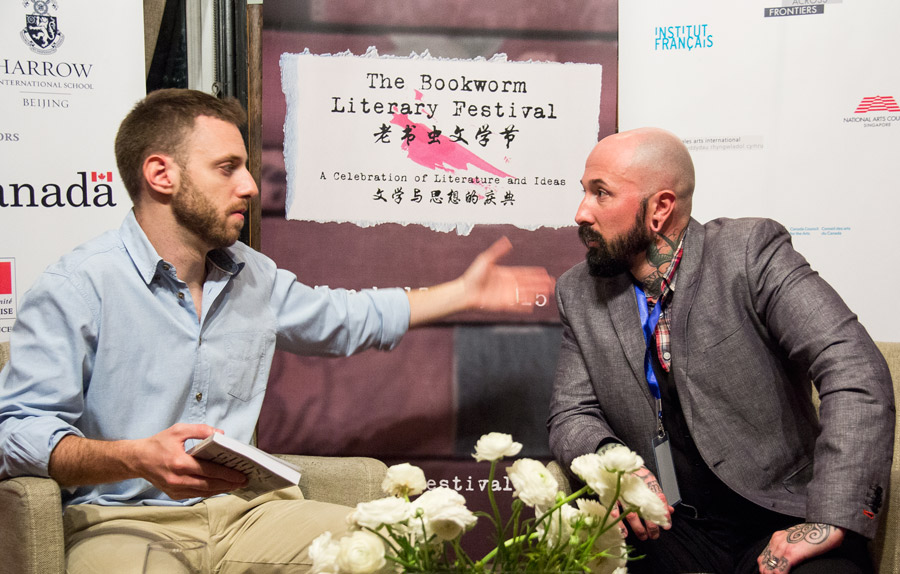
Authors who participate in The Bookworm Literature Festival (BLF) consistently say that they are amazed how a small independent bookstore can put on such an epically proportioned event. Visitors (expats and countrymen alike) from across China are pulled into participating cities to attend festival events and readings.
Because the Bookworm event is the lit event in China for international readers and writers. Of course, some people were disappointed that this year didn’t pull in heavyweight names (the likes of David Sedaris and Lionel Shriver appeared in the past), but coordinator Anthony Tao was quick to rebut: “There's a big difference, of course, between a lineup being "uninteresting" and a lineup not having authors that you, the singular reader, might not know.” It was clear that Tao was quite proud of what he termed “one of the [festival's] most eclectic and compelling lineups ever.”
The festival definitely managed to pack the house with a wide range of events. Authors discussed the searing pains and soaring joys of writing; community members shared their scribblings; and a healthy dose of children's events and workshops kept things hands on.
Things heated up early on when a group of authors held a frank forum China's sexual revolution that parallels its economic opening up. Sex specialists such as Jemimah Steinfeld (author of Little Emperors and Material Girls: Sex and Youth in Modern China) and Lijia Zhang (who researched prostitution in China for her novel Lotus) wrapped up the naughty bits in a prophylactic of academic analysis. Author Faramerz Dabhoiwala appropriately quipped that when a gay man comes out to his parents in America, the response is, “Oh no, our son is going to hell!” whereas in China the response is, “Oh no, we won't have grandchildren!” The audience was intellectually titillated and well entertained.
Meet the Author talks were a staple of BLF this year, where triads of authors would read and discuss their works before fielding questions from moderators and audiences. Author Brooke Davis' celebrated debut novel about grief has sparked a bidding war, and it was heartening for her to mention that she wrote it believing that it would be read by exactly two people: her thesis advisor and her father. Short story writer Mexican Guadalupe Nettel laughed at her resistance to write long form fiction. And Canadian editor Douglas Gibson poignantly responded with how he had once advised (now Nobel Prize winner) Alice Munro to forsake the novel if short stories were all she felt driven to compose.
Politics is always a healthy chunk of the festival, with its event titles such as “Tech in China” or “Xi Jinping: The Road Ahead.” One discussion with author Wade Shepard gave him space to discuss China's brand new metropolises which remain largely unoccupied, as detailed in his book Ghost Cities. The moderator Dan Levin (from the New York Times) repeatedly asked Shepard pointed questions, though Shepard simply refused to serve up the doom and gloom that the audience was craving. Not that he was obligated to, but the overall effect was that Shepard didn't have much of a thesis to drive at.
Politics, of course, can tie into pretty much any topic, and it certainly did at the Female Voice in Contemporary Art talk. Two provocative performance artists, Sun Shaokun and Xiao Lu, shared their works and the difficulties they faced as artists. Xiao Lu is no stranger to controversy, and having her exhibitions get closed by the authorities doesn't seem uncommon whether it be for firing a gun or for jumping unclothed into a Venice canal. Sun Shaokun also provoked viewers often using her own body as a canvas as a means to discuss everything from censorship of social media to illegal land acquisitions. If the audience was persistent about why the artists used their bodies for their art, and Sun and Xiao simply had to bluntly restate, “the form follows the concept.”
Post-festival, Tao was glowing. “The panel discussions we thought would do well did: Writing China Through History, [the] Environment Panel, Tech in China... these all sold out and the speakers delivered,” he raved. “But I was equally impressed by many other events that got less publicity: Douglas Gibson, who is Alice Munro's longtime editor, gave a brilliant presentation on Canada's literary luminaries; Ondjaki, one of Africa's best writers, captivated attendees in his only event at the Bookworm; Xiaolu Guo and Wena Poon had a lively discussion in Writing Across Cultures.” And he continued on to list other speakers, hardly able to contain himself. “It's probably unfair to single them out,” he admitted. “There were so many great talks.”
Of course, it would be difficult to isolate the highlights of such an event. Its roughly 80 events spanned more than two weeks in Beijing, Suzhou and Shenzhen. For next year the festival isn't likely to slow down. The Bookworm Literary Festival will enter its 10th year, so many people expect things to be bigger, badder and bookier than ever.


